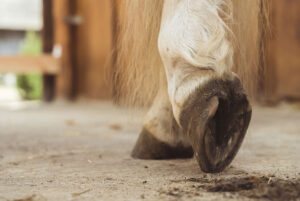Protecting Horses from Ticks
- Topics: Article, Horse Care, Insect Control, Lyme Disease

Protecting horses from ticks can be challenging. They usually pick up ticks while grazing in overgrown pastures, next to woods, or while being ridden through tick-infested areas. There are no shortcuts or magic tricks, but it helps to use the tick’s perspective when developing a management strategy.
Ticks spend most of their lives on the ground, digesting a blood meal, molting to the next developmental stage, or waiting for a host. Dry air and direct sunlight are their enemies. Ticks survive in brushy, overgrowth that provides increased humidity, protection from direct sunlight, and shelter for animals that are important hosts. Small mammals and deer help to support tick populations and move them around. Horses with access to scrubby overgrowth or along woods or tree lines are very likely to pick up ticks.
Pasture Management
Habitat management is the best way to manage tick-infested pastures and grazing areas. Mow and remove brush as practical to eliminate the protection ticks need to survive while they aren’t on hosts. When possible, use temporary fencing to keep horses out of areas that cannot be cleared. Habitat management is the best long-term route to reducing tick problems. In addition, cleared areas discourage wildlife that can reintroduce ticks and might provide improved grazing areas
Create a free account with TheHorse.com to view this content.
TheHorse.com is home to thousands of free articles about horse health care. In order to access some of our exclusive free content, you must be signed into TheHorse.com.
Start your free account today!
Already have an account?
and continue reading.
Related Articles
Stay on top of the most recent Horse Health news with


















